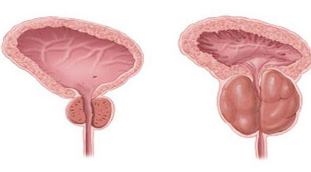Inflammation of the prostate, is unfortunately a relatively common disease. According to statistics, almost half of the men confronted in this or that age, with this Problem. The causes of the inflammation can be different, and therefore, in modern medicine, there are different types of this disease. One of which is bacterial Prostatitis.

With such a large spread of the disease many men are interested in more information about him. What are the causes of bacterial inflammation? What are the symptoms you should be aware of? What are the methods of modern treatments are most effective?
What Prostatitis is? The main forms of the disease
Before you understand the question, what is bacterial Prostatitis, is, what is the prostate or the prostate. It is a small Organ that is a part of the reproductive organs. He is a little below the bladder around the urethra. The prostate produces up to 70 percent of the seminal fluid, which then mixed with the sperm in the testicle is formed. The prostate plays a role in the process of release of sperm and supports an erection. Apart from the fact that it is influence on the Retention of urine.
Prostatitis — the disease characterized by an inflammatory process in the tissues of the prostate. Depending on the causes of the development of modern medicine, a number of main types of the disease:
- acute bacterial Prostatitis is an inflammation in this case develops on the background of infection in the body by specific bacteria (e.g. chlamydia, gonococcus, etc.);
- bacterial Prostatitis the chronic Form, in General, improper treatment, or its absence, is developed against the background of (the disease lasts for more than three months, a period of well-being gives way to exacerbations of the inflammation);
- nonspecific Prostatitis — inflammation of the in this disease due to the activation of conditionally pathogenic microflora, or not at all associated with a bacterial infection;
- asymptomatic inflammatory Prostatitis usually has no symptoms, and often the inflammatory process breaks down.
Causes of bacterial Prostatitis
As the name suggests, an inflammatory process in this case connected with the activity of bacterial microorganisms. The pathogens of bacterial Prostatitis often invade the tissue of the prostate, if the Patient is sexually transmitted infections. Almost all of the diseases, sexually transmitted infections (e.g. gonorrhea, chlamydia), this can lead to inflammation of the prostate gland.
In middle-aged men as the causative agent can act and conditionally pathogenic microorganisms, e.g. Escherichia coli. A somewhat different picture emerges in the case of older patients. The fact that in many men over age 50 is diagnosed, the so-called benign prostate hyperplasia (accompanied by a Proliferation of the tissue). In such a pathology the evacuation of the secretion of fluid from the prostate is obstructed, causing it starts, collects in the glands. The Stagnation of secretions leads to an active proliferation of pathogens and thus to an inflammation.
Bacterial Prostatitis may develop on the background of various diseases of the genitourinary system. For example, the inflammation is much more frequently the bladder, urinary tract infections, epididimita, Urethritis is diagnosed against the background of the obstruction. The dissemination and penetration of infection inside promotes phimosis (splicing extremely meat). Provoke inflammation of the prostate can.a variety of injuries of the perineum, the Installation of a urinary catheter, the previously performed cystoscopy (an internal examination of the bladder) or biopsy
There are risk factors?
As you can see, the causes of the inflammation of the prostate may be different. In addition, there is a group of so-called risk factors whose presence increases the likelihood of acute and chronic Prostatitis:

- frequent infectious diseases of the genitourinary system;
- parasitic diseases;
- incomplete emptying of the bladder;
- genetic predisposition;
- Irritation of the urinary channel with aggressive chemicals;
- strong cooling;
- disorderly sexual life (frequent change of sexual partners, and contacts without the use of a condom);
- Smoking, drug and alcohol consumption (it weakens the immune system);
- weakened immunity;
- prolonged sexual abstinence;
- strong dehydration of the body;
- a wrong diet;
- neurological disorders of the urinary tract;
- Long-term stress, Burnout, emotional stress;
- Lack of movement leads to Stagnation of blood in the small pelvis (increasing the likelihood of inflammation of not only the prostate, but also of several other nearby organs).
What are the symptoms of the disease accompanied?
Signs of a bacterial Prostatitis is usually quite characteristic. The disease begins acutely and develops quickly. Often the patients are mainly elevated body temperature, weakness, General aches and pains in the body, fatigue, muscle pain, nausea and vomiting to notice.
Together with this, there are problems with the work of the genitourinary system. The process of urinary urge difficult and painful, tendons and more. But the bladder is not completely emptied. The beam in the water is weak, even the urine is quite unpleasant smell. Also in there is a little impurities of the blood. Perhaps the emergence of pain and burning in the urethra.
The patient frequently, and other symptoms of bacterial Prostatitis. In particular, the pain appears on the area of the pubic area, which is also in the lower part of the back. It can cause pain in the testicles and the perineum. In men, problems with erection and ejaculation, accompanied by painful sensations. Sometimes, in the seminal fluid, you notice traces of blood. Also pain during defecation.
You experience these symptoms, you should immediately consult a doctor. The sooner the Patient receives medical help, the lower the probability of the transition of the disease into a chronic Form.
Chronic bacterial Prostatitis
Immediately it should be noted that this Form of the disease is very rare. Chronic bacterial Prostatitis may be associated with the activity of bacteria that are protected from the effects of the drugs, so how deep in the tissues of the prostate. In addition, some microorganisms are resistant to antibiotics broad spectrum of effects.
Exacerbation of chronic bacterial Prostatitis accompanied almost the same symptoms as the acute Form of the disease. It is pain during urination, pain in the abdomen and the Perineum, the presence of blood in the urine and seminal fluid. On the other hand, fever and other signs of a poisoning of the body are rare. Aggravation gives way to period of relative prosperity — man feels good, but some irregularities in the work motschepolowoj the systems, there is still. In particular, patients suffering urinate under a variety of the urge to. Also the problem with the erection (sometimes to serious erectile dysfunction), and decreased sexual stick drive.
The diagnosis of the disease
For the beginning of the doctor for a physical examination and medical history leads, to collects a complete picture of the symptoms that disturb the patient. In General, this is enough to suspect, Prostatitis, and additional analyses assigned to it.

The Patient gives samples of blood and urine, to detect the analysis helps markers of inflammation. In addition, a digital rectal examination of the prostate, and this is, perhaps, the doctor to determine the dimensions, contours, the consistency of the organ, the extent of the pain and some other parameters. In addition, during the prostate Massage, you can rehearse your secret, then move on the laboratory analysis. Sowing samples helps determine the type of infection and the degree of their sensitivity to one or the other drug.
Further investigation only occurs if there is a suspicion on the presence of complications. With the help of cystoscopy, the doctor can bubble examine and assess the condition of the urinary canal and of the urinary. Sometimes, in addition, urodynamic testing is performed. TRANS-rectal ultrasound and computed tomography help to better examine the condition of the prostate, the presence of abscesses or stones. In the case of suspected malignant transformation of cells, a biopsy of the prostate.
Drug treatment of Prostatitis
After conducting a full examination, the doctor will be able to form a highly efficient control of the therapy. In the rule, in the first line is assigned to, is the treatment of bacterial Prostatitis antibiotics. In particular, very effective anti-bacterial agents are considered to be drugs, tetracycline, and ciprofloxacin. Depending on the degree of severity of the disease and the types of the infection, the antibiotic therapy may be in a period of four to six weeks. Sometimes in the first few days of the medication can be administered intravenously, and then go to the Form of the tablets. In the chronic Form of the inflammation, the treatment can take up to 12 weeks.
Also be used other medicines for the treatment of bacterial Prostatitis. In particular, the condition of the patient antispasmodics, which relax the bladder neck and reduce pain in the water can make it easier.
If necessary, the patient's pain reliever not prescribed to them, namely non-steroidal anti-inflammatory agents that help also fever weight loss. A positive effect on the condition of the men, the impact of taking a Multivitamin complex, immune modulators, and Bio-stimulants.
Other methods of treatment
On the reducing Phase of the patient is often the Massage of the prostate is recommended. This procedure helps in removing the Stagnation of liquids, the improvement of the tissue metabolism, improve the local immunity, recovery of the Drainage function of the prostate, but also increases the blood circulation.
During the treatment, various methods can be used physiotherapy, in particular:
- Magnetic field therapy;
- TRANS-Rectal Ultrasound Therapy;
- Electro-stimulation.
All of these methods contribute to the normalization of blood circulation and the elimination of stagnant processes.
If the Operation is necessary?
Surgery is an Extreme measure. It is only when long-term drug therapy and other treatments have no effect. Surgical procedure for partial resection of the prostate performed in the elderly patients. At a young age such a radical treatment to try to avoid, because it can sometimes lead to impotence and infertility. The surgery are often elderly patients with chronic forms of Prostatitis, because you have to suffer many years problems with urination, and constant pain. In addition, a plastic correction is performed, which helps in special ways, normalize bladder, the work of the urine.
Alternative methods of treatment of the disease
Of course, there are also some other, less traditional methods of treatment of Prostatitis. For example, sometimes a good effect of medicines, micro-give enemas, treatment with leeches, acupuncture, Massage.
Patients with chronic forms of the disease recommend treatment. A positive impact on the condition of the body specific physical exercises to restore the blood circulation and eliminate blood stasis in the organs of the small pelvis.
As for the treatment of bacterial Prostatitis with the help of the people's funds? Until today, there are many Tools, in order to eliminate the inflammatory process. In particular, a positive effect on the condition of the pelvic organs sometimes, warm sitz baths decoction of yarrow, horsetail, sage. Also prepare special suppositories rectal of bee products and herbs.
In any case, it is important to remember that prior to the application of any medium must necessarily consult to the attending physician.
What are the forecasts for the patients?
Whether the treatment of bacterial Prostatitis to achieve in men good results? Immediately is to say that the success of the therapy depends on many factors, including the stage and Form of the disease, age of the patient, the presence of comorbidities, etc.

Acute bacterial Prostatitis is well-suited for the medical treatment. Already a few days after the start of therapy, the Patient can note the improvement of the health. On the other hand, improper treatment, the absence or termination (for example, very often, the men stop using the medication when the symptoms have disappeared, to complete the course) could be the development of chronic forms of the disease
Chronic Prostatitis is a disease to treat the much more difficult. Relapse can happen over and over again. And in such cases, doctors often recommend patients surgery. Results of surgical treatment in General, positive. Here, too, an Operation is sometimes fraught with all-too-pleasant consequences.
























